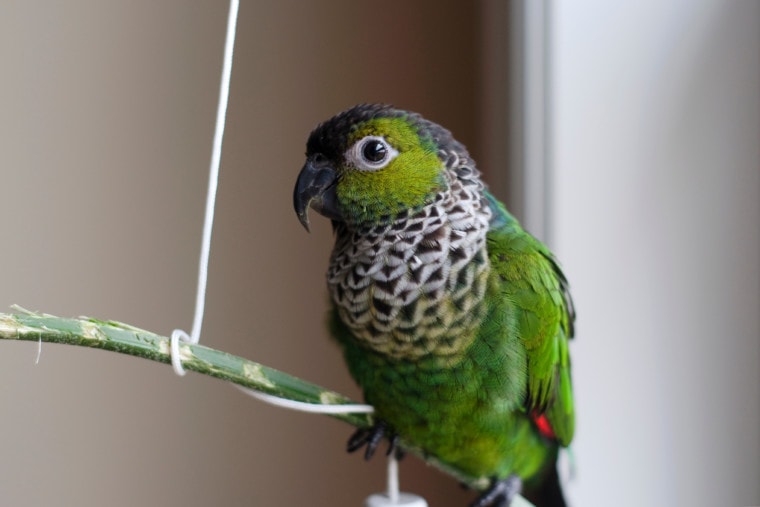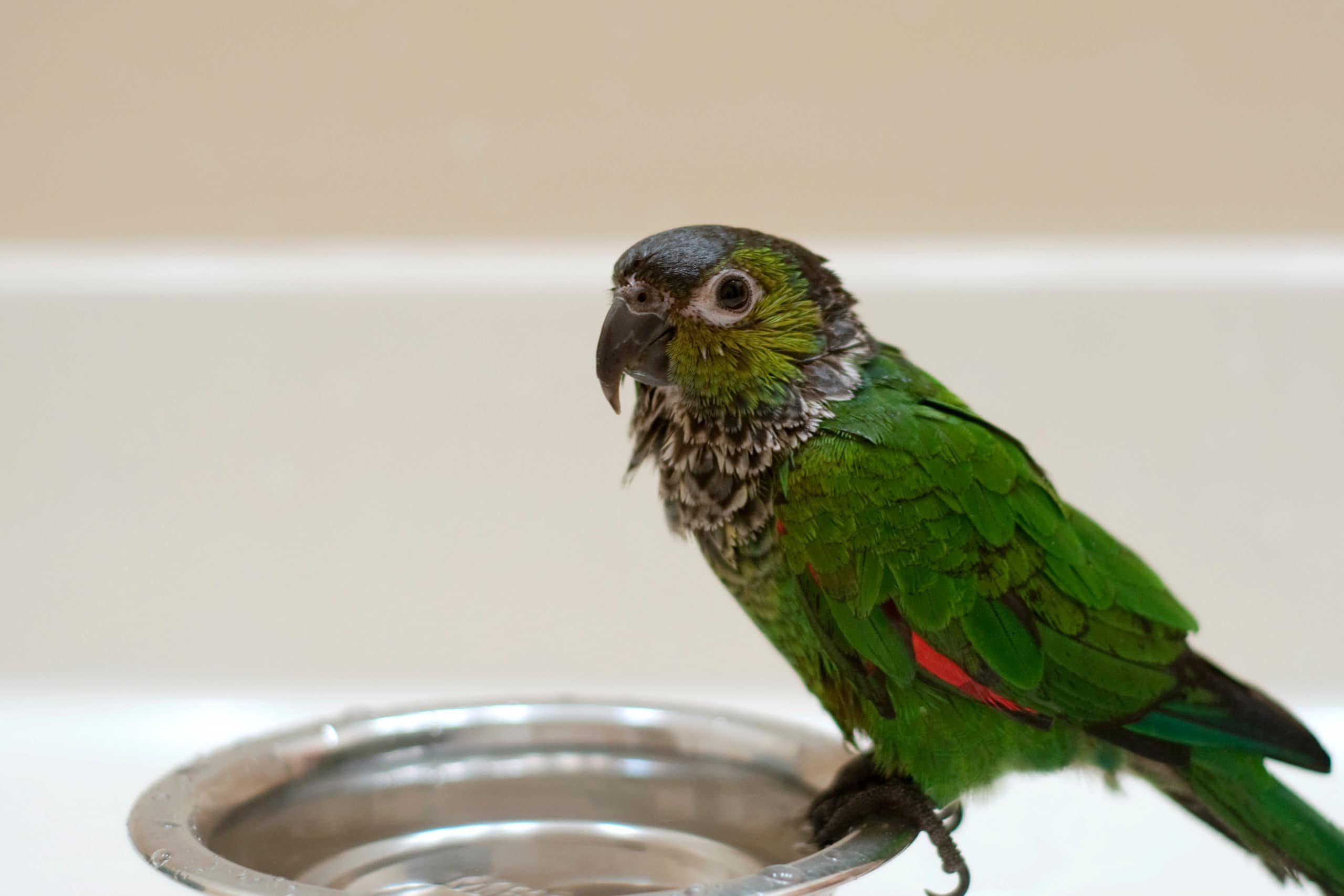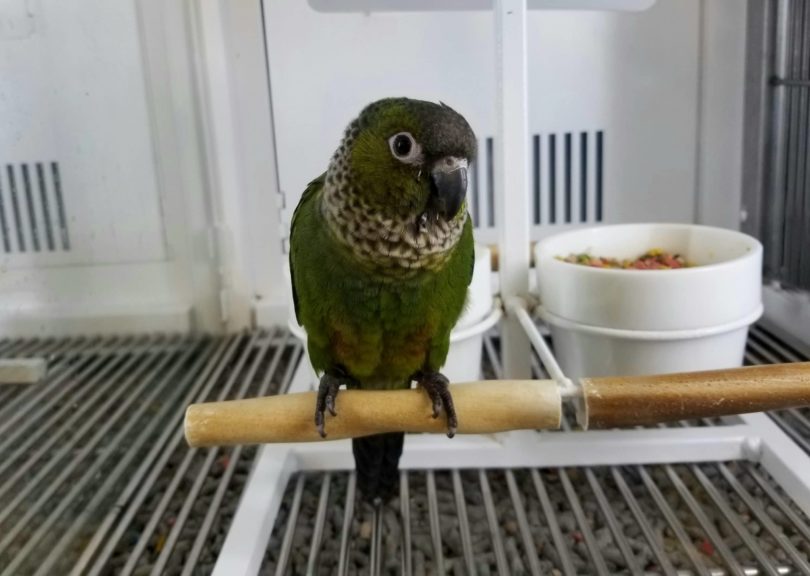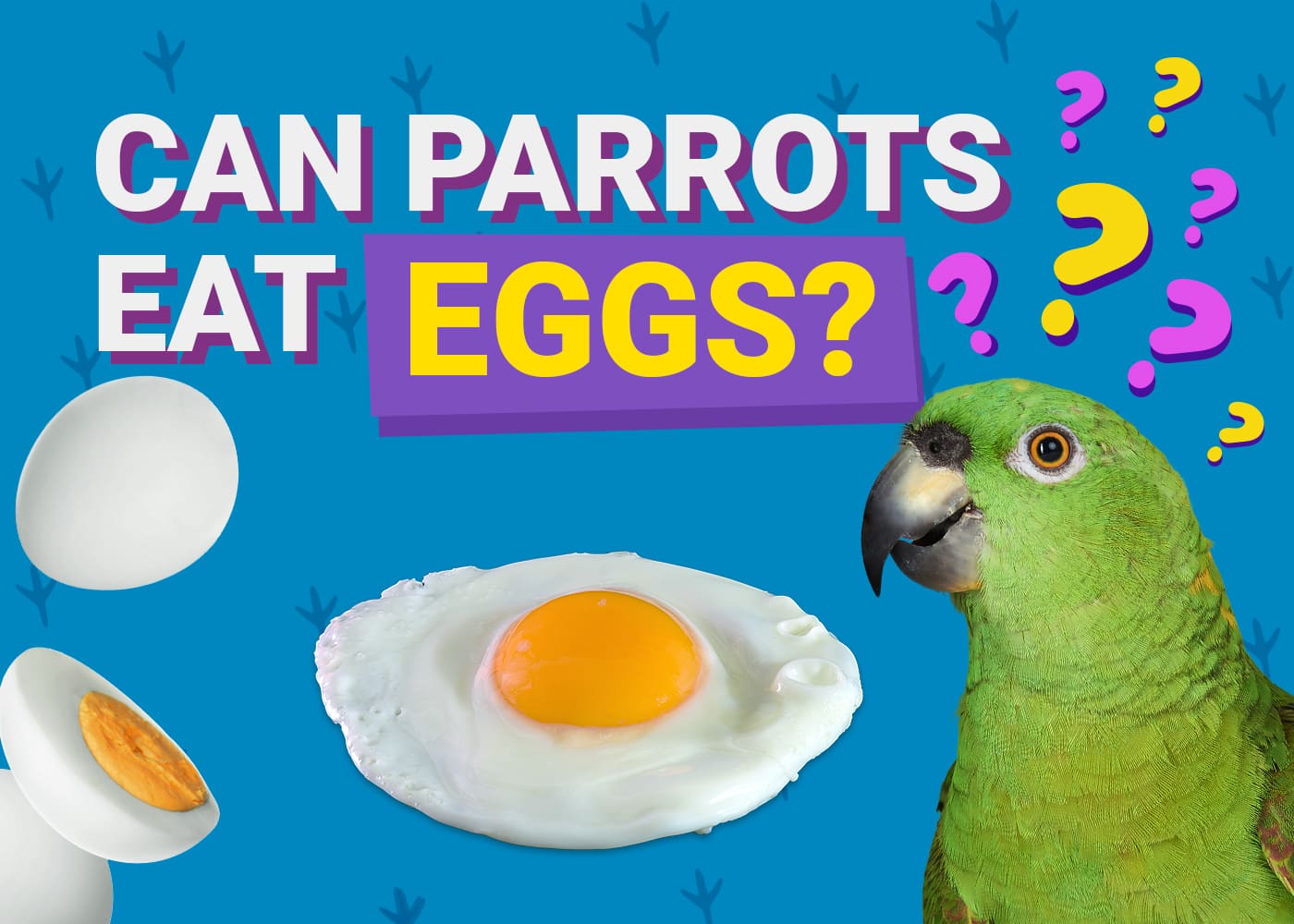
The black-capped conure is an exotic-looking bird with a green body and a brown-black “cap” on its head. Like other parrots, they are social animals that love spending time with their owners. Keep reading our care guide to learn more about whether or not these birds are a good fit for you and your family.
 Species Overview
Species Overview
| Common Names: | Black-capped parakeet, rock conure |
| Scientific Name: | Pyrrhura rupicola |
| Adult Size: | 10 inches long, weighing up to 2.5 ounces |
| Life Expectancy: | 10-30 years |
Origin and History
The black-capped conure, also known as the black-capped parakeet or rock conure, is a species of parrot with origins in South America. These birds are most commonly found in Bolivia, Peru, and Brazil, where they have a natural habitat in the humid forests of the Amazon Basin. Black-capped conures in the wild can live anywhere from the Amazonian lowlands to the tops of the Andes mountains and are capable of flying as high as 6,000 feet. Due to the continued deforestation of the Amazon, wild black-capped conures must seek refuge at higher elevations. The destruction of the black-capped conures’ natural habitat has resulted in this species being considered “near threatened” for extinction.

Temperament
Overall, the black-capped conure is a playful and social animal that makes for a great pet. If you decide to purchase one of these birds, you should keep in mind that they require a lot more attention than you might expect. Once they become comfortable with you, they will want to interact and play with you daily. Over time, you will likely notice that your black-capped conure is very comfortable around you and other members of your family, though it might take him some time to warm up to new people such as house guests.
In addition to social interaction, your conure needs mental stimulation. The black-capped conure is a very intelligent animal that can easily become bored. One way to make sure your black-capped conure gets the stimulation he needs is by providing him with plenty of toys. Conures and other parrots often chew on bark and other objects in the wild, so, naturally, your bird will also be interested in chewing anything it has access to—even the bars of its cage. Providing your black-capped conure with a wooden toy made for birds will not only prevent him from chewing on other things but will also keep him busy. You should also consider placing your bird’s cage in a busy area of the house. That way, your bird will be stimulated in addition to being less likely to feel lonely.
Speech & Vocalizations
While conures and other parrot breeds are infamous for being noisy creatures, the black-capped conure is actually a relatively quiet bird. They do make calls in the morning and the evening—known as contact calls—but otherwise, they aren’t known for being very talkative. That being said, if you are looking for a parrot that is capable of learning words, the black-capped conure may not be the bird for you. They can learn a few phrases and words with diligent training, but they are nowhere near as proficient at learning to talk as other parrots.
Black-Capped Conure Colors and Markings
The black-capped conure is so called due to the brownish-black coloration that looks like a “cap” on top of its head. There is one variation of this species called the yellow-sided black-capped conure due to its yellow coloration on its neck and head. Otherwise, these birds tend to be almost entirely green with tinges of red under their upper wings. The abdomen is also usually green, but with a blue undertone. The feathers under their tails are gray, along with their beak, legs, and feet. Unlike other birds, there is no distinguishable difference in coloration between male and female black-capped conures. In order to figure out the sex of your black-capped conure, you should bring it to your veterinarian to perform DNA testing.
Caring for the Black-Capped Conure
The black-capped conure is a relatively small bird that doesn’t require a very large cage. However, you should make sure that the cage is 18 inches wide and 2 feet high, at minimum. Consider whether or not you will be able to take your bird out of its cage for frequent and relatively long exercise breaks. If you don’t have the time to take your bird out of its cage for 2 or more hours of supervised activity, you should think about investing in a larger cage that will give your black-capped conure plenty of room to fly around. If you have room, you should consider buying your bird an aviary, which is a type of enclosure that offers more space than a birdcage. Make sure your bird’s cage or aviary has plenty of perches and chew toys. You should always keep your bird’s food and water bowls relatively high up to prevent any feces from contaminating them. Most bird dishes should be able to easily attach to the side of your bird’s cage.
Black-capped conures are naturally social creatures. In the wild, they tend to live in groups of around 30. Therefore, as stated, you must give your black-capped conure plenty of activity and social interaction. One easy way to make sure your bird feels stimulated and doesn’t feel lonely is to place its birdcage in a busy area of the house, such as your living room. Even when you aren’t directly interacting with your black-capped conure, being in the center of activity will help keep your bird from feeling lonely.

Common Health Problems
Luckily, the black-capped conure tends to be a fairly healthy bird with very few common health problems. However, they may be prone to certain health problems that can affect all avian species. Below, we have outlined some of the issues you should look out for to be sure your black-capped conure stays healthy.
Diet and Nutrition

Wild birds typically eat a diet comprised of nuts, seeds, berries, fruits, and vegetables. Birds in captivity usually eat a pelleted diet formulated to meet their nutritional needs. In addition to pellets, you can and should offer your bird nutritious treats in the form of fruits, lightly cooked veggies, birdseed, and even protein such as chicken and hard-boiled eggs. When looking for bird treats in stores, make sure to check the ingredients list to make sure that the treat is primarily made up of whole foods and does not contain any artificial flavors or preservatives.
Exercise
The black-capped conure needs a relatively large amount of exercise to remain healthy. You should plan on giving your bird at least 2 hours of time outside of its cage per day. Be mindful of where you let your bird play; as mentioned, black-capped conures and other birds love to chew, so if you don’t want your furniture to be ruined, keep your bird away from it. If you have the space, you can purchase “playgrounds” and play gyms specifically made for birds that will give your black-capped conure a place to explore that is safe for him and won’t ruin your couch.
Where to Adopt or Buy a Black-Capped Conure

If you’ve decided the black-capped conure is right for you, the next step is finding one of these birds. One of the first steps you can take is checking around at your local pet shelters to see if they happen to have a black-capped conure. You can also try a service such as PetFinder, which will search your area for specific breeds and often includes animals in shelters.
If you don’t have any luck finding a black-capped conure at a local shelter, you will need to look for a breeder, as you are unlikely to find one of these birds at a pet store. Be sure to ask your breeder plenty of questions in order to vet them. Any good breeder will be willing and able to tell you how long they have been a breeder and information about your bird’s health history, and some may even let you tour their breeding facilities. You can expect to pay between $400-$600 for one of these birds, so it’s important for both you and your bird’s health to make sure the breeder is reputable.
 Final Thoughts
Final Thoughts
Overall, the black-capped conure can be a wonderful family pet for many different types of homes. When considering whether or not you want to buy or adopt one of these birds, ask yourself the following questions: Do you have time to give your conure the exercise and social interaction it needs? Do you have space in your home for an adequate bird cage or aviary? If the answers to these questions are yes, the black-capped conure could be the pet for you!
See also:
Featured Image Credit: UniqSnaps, Shutterstock

 Species Overview
Species Overview






